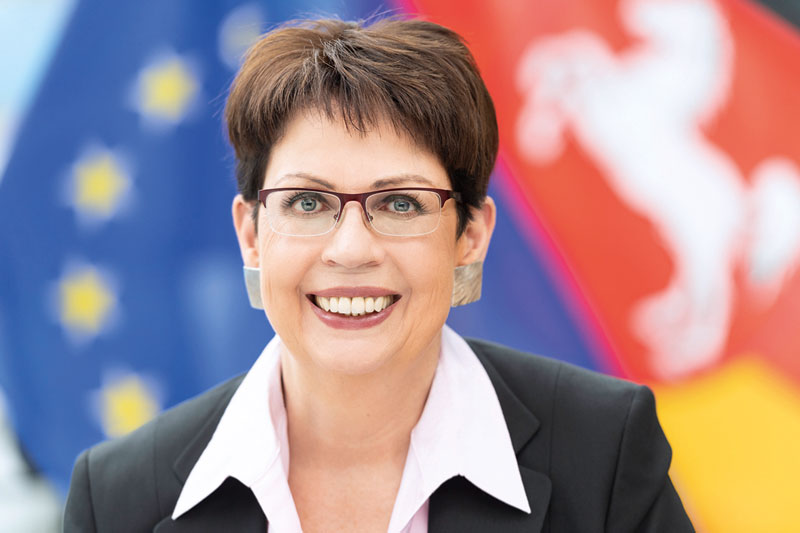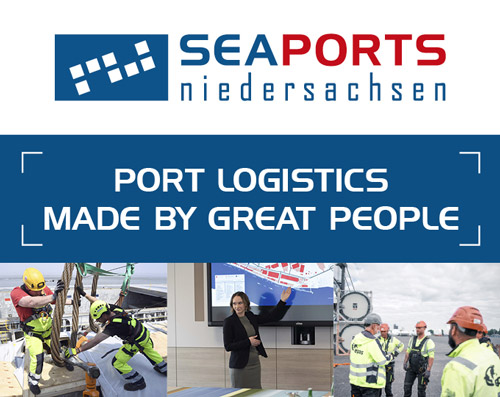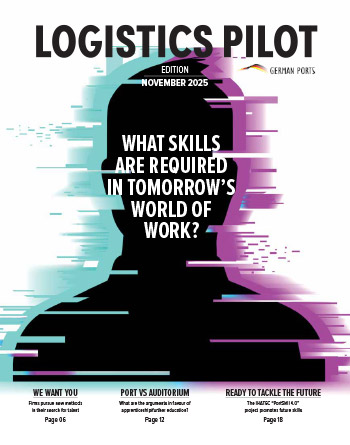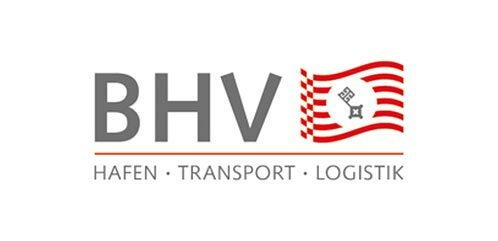How Brexit is playing out may differ in the UK and on the continent. However, the crisis in Ukraine is now welding Europe closer together again – regardless of EU membership. The period of bipolarity between the UK and the EU is likely to be over for the time being, with potentially positive effects on trade too.
Economically, however, the UK is clearly feeling the consequences of leaving the EU. “The long-term impact of Brexit is worse than Covid,” Richard Hughes, head of the Office for Budget Responsibility (OBR), warned the public broadcaster BBC last October. Leaving the EU will reduce the UK’s potential gross domestic product (GDP) by about four per cent in the long term, he added.
The UK lags behind in the G7
“In 2021, despite the exceptionally strong recovery, UK exports to the EU increased by only seven billion pounds, compared to more than 40 billion in 2017, for example, which was a good year economically,” Ana Boata, Head of Economic Research at Allianz Trade (formerly Euler Hermes), also reports. In terms of volume, she said, the UK was the only G7 country to see exports fall by 1.1 per cent last year (after dropping by 14 per cent in 2020) compared to a 10.4 per cent rise in global trade.
“We estimate that it’ll take until the beginning of 2023 for British exports to return to their pre-Brexit levels, as post-Brexit trade barriers continue to prove challenging,” said the economist. “Twenty per cent of the current delays in supplier delivery times could be due to Brexit, with the rest due to global bottlenecks.”
The share in exports from Germany to the UK as a percentage of total EU exports, in particular, have suffered since 2018, with a drop of almost three percentage points to 11.7 per cent. Simultaneously, the UK’s imports from China have increased significantly since the Brexit referendum, with their share doubling to 16 per cent.
Previously positive expectations for the development of exports have been significantly dampened by the crisis in Ukraine. “Before the war, we expected German export volumes to increase by 6.5 per cent in 2022 and 4.5 per cent in 2023,” Boata explains. Forecasts have meanwhile been revised downwards to 4.4 per cent and 2.1 per cent respectively. “ For 2022, we expect German exports to the UK to increase by a total of ten billion euros.”
British ports are struggling
British ports handle 95 per cent of the UK’s international trade, amounting to around 500 million tonnes. According to Statista, the total index of throughput in tonnes in the third quarter of 2021 rose by one point compared to the previous year. However, the volume of goods passing through UK ports in this quarter was below pre-pandemic levels in terms of tonnage. To what extent the transshipment volumes in Felixstowe developed last year was not published by the editorial deadline. In previous years, Britain’s largest port, which plays a crucial role in the country’s trade due to its road and rail hinterland connections with distribution centres in the Midlands, experienced a decline in tonnage. While it handled around 3.8 million TEU in 2019, the figure recorded in the first year of the pandemic was only 3.2 million TEU. In 2019 and 2020, Felixstowe ranked eighth, directly behind Bremerhaven in the ranking of Europe’s 15 largest container ports, but did not make the list at all in 2021. Congestion and handling problems also led Maersk and MSC (also known as the 2M alliance) to reroute its AE7 service connecting Asia with Europe from Felixstowe to Wilhelmshaven between November 2021 and March 2022 last year. This rotation was only switched back at the beginning of April.

“We estimate that it’ll take until the beginning of 2023 for British exports to return to their pre-Brexit levels.”
Ana Boata, Head of Economic Research at Allianz Trade (formerly Euler Hermes)
British economy still ‘European’
How are these developments being received in the British business community, though? “As the referendum result was so close in favour of the Leave side, I had actually expected the reactions among people in the business community to be proportionally similar when this sensitive topic came up,” says Peter Decu, who has represented Bremen Economic Development Agency (WFB) in the UK from London since January 2021. Yet after visiting some 28 trade fairs with over 650 contacts at manufacturing companies in the UK, he paints a different picture. “In all the conversations with contacts from the business community, I have only met four Brexit supporters, although one of these companies also only sells its products in England.” Most of the people he spoke to were staunch Europeans who would have preferred the government handle things differently, especially since the referendum was only a recommendation anyway. “We are probably the only country in the world that sanctions itself,” one person is reported to have said.
In the meantime, most businesses have somehow come to terms with Brexit. “They tell me that Brexit is basically doable, it just takes more effort, more time and more money,” states Decu. The certificates that are now required make it particularly difficult in the food industry. “One frozen fish manufacturer told me that he had looked at the numbers and concluded it wasn’t worth the effort. He now only sells within the UK and to non-EU countries.
The main criticism is that there are still significant differences between the EU member states in terms of what has to be declared and which customs documents are required. This lack of uniformity is also problematic for HGV drivers, creating much frustration at a time when there is a shortage of drivers anyway. “Overall, however, the British are taking a very pragmatic approach to Brexit, and most wish to continue trading, even though it has become more complicated,” Decu stresses. The British rejoining the EU in the foreseeable future is a non-starter, even if most of the remaining EU27 are hesitant to be the ogres of the tale. “They hope that common sense will prevail eventually,” he says.
Shifts in volume at Cuxport
Cuxport has felt the effects of not just Brexit and the Covid-19 pandemic, but also of the semiconductor crisis. “Overall, there has been a significant decrease in volume since 2019,” Oliver Fuhljahn, Head of Business Development Automobile Logistics, reports. “With exports, the drop is 20 to 25 per cent.” Brexit has, however, seen Cuxhaven be designated as one of the main ports for importing Minis from the UK. The volumes gained as a result significantly mitigate the loss in exports.
“Delivery times of up to one year for cars also lead to shifts in volumes,” says Fuhljahn. Plus, there are production stoppages – sometimes for whole months – which caused a switch to other brands. “But this doesn’t just affect Cuxhaven. There were slumps everywhere here in the north.” However, knowing how much blame to attribute to the pandemic, disruption and supply bottlenecks, of chips, for example, is very difficult.
There has been a positive trend in paper, cellulose (bulk cargo) and consumer goods, and the port service provider is also recording growth in what is known as ‘unaccompanied’ transport. By contrast to pure land transports, where the considerable driver shortage in the UK is also having an increasing impact on the continent, this is not such a big problem here. “DFDS and UECC only offer unaccompanied services with freight-only ferries,” Fuhljahn explains. “As there aren’t many cabins on board for lorry drivers, there’s little need for personnel management or for Covid-19 measures. Trailers are unhitched and Cuxport transports them on or off the ship.”

“We are probably the only country in the world that sanctions itself.”
Peter Decu, Bremen Economic Development Agency (WFB)

“Delivery times of up to one year for cars also lead to shifts in volumes.”
Oliver Fuhljahn, Head of Business Development Automobile Logistics
Close neighbours, despite Brexit

Minister Honé, trade relations between the United Kingdom and Lower Saxony have traditionally been very close, but what is the situation like after Brexit?
Birgit Honé: The ties run deep, not least because the House of Hanover provided a British royal dynasty and the British founded our Bundesland. Indeed, there are many links, such as the one between Leuphana University in Lüneburg and the University of Glasgow. But with trade, in particular, figures are clear. Since the Brexit referendum in 2016, the UK has dropped one place in our list of trading partners, and it’s quite possible that it will drop out of the top ten very soon.
How did you experience this on your delegation trip to England and Scotland in late March?
Birgit Honé: There’s great interest in close cooperation and good trade relations. The neighbouring markets across the English Channel are more tempting than those in countries on the other side of the world.
What do the British people you met on your trip expect from politics and economics in Lower Saxony?
Birgit Honé: The people I spoke to wanted close relations with as much free trade and as little bureaucracy as possible. Moreover, they were very interested in cooperating in the renewable energy sector. We’re very open about that, but one thing’s still clear – differing standards automatically create hurdles.
And what opportunities does the changing geopolitical situation offer?
Birgit Honé: Putin’s war of aggression in Ukraine has made it clear to all of us that living in peace and freedom can’t be taken for granted, even in Europe. The EU and the United Kingdom stand together – Brexit or not – on the same fundamental values. This unites us in resisting those who endeavour to eliminate these values.
Most read
Logistics Pilot
The current print edition - request it now free of charge.
The trade in goods has even increased as a result, he says, because the daily connections make trailer loading quick and reliable. In addition to HGV transport, Cuxport, which operates trimodally, also offers rail and inland waterway connections. Due to the current and developing driver shortage, the handling of paper, wood and cellulose as well as the export of kraft paper from the UK will also increase in the general cargo sector.
Last December, the intermodal rail connection for trade between Austria and the north and south of England via Cuxhaven was also tested. The trains with Austrian trailers are unloaded in Cuxhaven and immediately reloaded. At the same time, freight ferries arrive with import trailers and, in the same shift, load the trailers that have arrived by train. “You work hand in hand here, in paired traffic.” One train unit’s test run of three round trips within a week was very successful, he reported, especially given the round trip was in pairs. “Instead of these first three trains with 38 unaccompanied trailers, there could be more,” Fuhljahn adds.
The trade routes to and from England have also always been a focus for logistics company DSV. “Brexit has led to more administrative effort – both in terms of how the British do things and made worse by our German bureaucracy and its analogue workflow,” says Peter Fog-Petersen, Managing Director at DSV Road. “These two elements are not conducive to maintaining market-relevant freight transit times between the two countries.” In order to regain pre-Brexit levels, current improvements would have to be intensified still further.
Phil Werning, Managing Partner of I.R.F. Bremen Spedition, which makes daily round trips to the UK and back, can confirm this. “The effort has increased drastically,” he says, “both in paperwork and customs clearance. But, when you know how to do it, it works well. When our customs agents perform the customs clearances, it runs smoothly.” The courier’s most significant advantage is that it ships trailers mostly without tractor units, meaning that it is not the driver who suffers if there are delays at customs.
Prior to Brexit, a lot of uncertainty in the economy had soured the business, 70 per cent of which is done with the UK at I.R.F. and involves daily journeys there and back. “I always hoped that, as UK specialists, we might end up taking advantage of it,” he adds. Indeed, that has come to fruition. “We’re seeing an increase in volume. However, I think this is because our competitors can’t meet the increased demands and thus can’t serve the market any more.”
“I assume that German goods and goods from other countries stored in Germany will continue to be in demand in the UK and sold there,” Werning continued when asked about future developments. “We will then be on hand to transport them. The trade relationship will remain at least as it is at present, or even improve. Indeed, Europe clearly needs the British as much as the British need us.” And burying your head in the sand is certainly not an option. (cb)

“Brexit has led to more administrative effort.”
Peter Fog-Petersen, Managing Director, DSV Road.
Fishing and Brexit
Brexit also has an impact on fishing. “EU fishing quotas for some key stocks will drop by 25 per cent, in favour of the British, over the next five years,” reports Peter Breckling, Secretary General of the German Fisheries Association. “This means we have to adjust fishing activity and capacities. This is what companies are contending with at the moment.” The EU has set up a Brexit Adjustment Reserve (BAR) for this purpose. However, using or redeeming these funds is much more difficult in Germany than in neighbouring countries. “Presently, it’s unclear whether the funds of 60 million euros available for Germany can be used on time, if so, how, or whether they’re to be returned unused,” Breckling underlines.
Uwe Richter, Chairman of the German Deep-Sea Fishing Association, understands just what the implications for transshipment in Cuxhaven and Bremerhaven are. “Our Doggerbank vessels have unloaded several times in the Faroe Islands, as opposed to in Bremerhaven, so as to shorten the journey from the fishing ground to the unloading port. This is due to the delayed start to fishing caused by Brexit.” For example, Doggerbank Sea Fisheries handled 34,635 tonnes in 2020, but only handled 21,645 tonnes in 2021. At the same time, the number of berth days increased from 645 (in 2020) to 897 (in 2021) despite fewer vessel calls, but the use of local services decreased because of this.
“Ultimately, it’s up to the shipowners to decide which landing location will yield the best return for their catches, so the question of access to fishing quotas is only one aspect of the decision,” adds Matthias Keller, managing director of the Federal Association of the German Fish Industry and Wholesale Trade. “A greater handling burden has arisen in the many additional commercial documents that must be processed. The costs for this come on top.”

“The trade relationship will remain at least as it is at present, or even improve.”
Phil Werning, managing partner of I.R.F. Bremen Spedition










